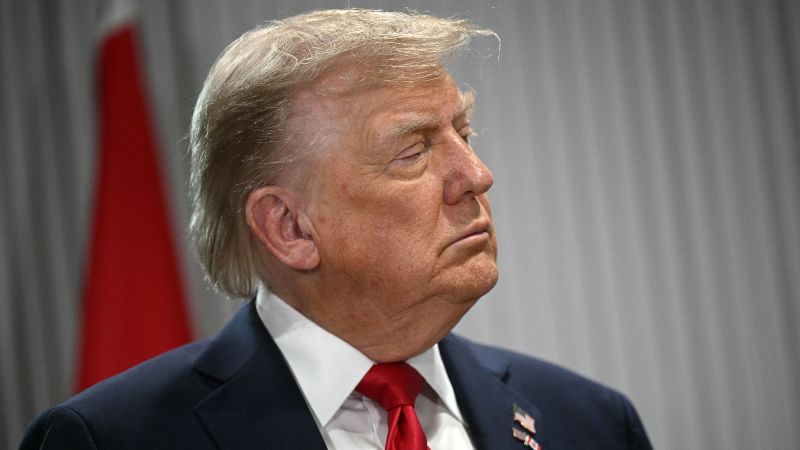Calgary, Alberta CNN — President Donald Trump has decided against signing a joint statement from G7 leaders intended to promote de-escalation between Israel and Iran, according to a source close to the matter. While G7 officials remained hopeful that Trump could be persuaded to endorse the statement, the draft, primarily crafted by European leaders, asserts Israel’s right to self-defense and insists that Iran should not be allowed to develop nuclear weapons.
This refusal to sign marked an immediate divergence between Trump and his fellow leaders as the summit commenced in the picturesque Canadian Rockies. Just hours before the gathering, G7 delegations continued discussions to refine the language of the draft statement.
Leading the effort were European officials, including French President Emmanuel Macron, German Chancellor Friedrich Merz, and British Prime Minister Keir Starmer, who sought to reach a consensus about the tumultuous situation in the Middle East with the summit’s host, Canadian Prime Minister Mark Carney.
Trump, known for his skepticism towards multilateral organizations like the G7, has opted to withhold his endorsement for the time being, postponing what could have been a unified front among the world’s democracies. A White House official commented, “Under the strong leadership of President Trump, the United States is back to leading the effort to restore peace around the world. President Trump will continue to work towards ensuring Iran cannot obtain a nuclear weapon.”
A high-ranking official from the White House explained that Trump felt no current need to attach his name to the statement, citing what he has already expressed publicly concerning the Israel-Iran conflict. When asked if signing the statement might illustrate unity among the leaders, the official remarked that Trump’s presence at the summit, requested by other leaders, was itself a sign of solidarity.
A senior Canadian official indicated that discussions on the statement’s wording would proceed among the G7 delegations, with European leaders particularly hopeful of achieving a common ground. “This is not a done deal yet, this is something that will be discussed at the leader level. We expect that the bulk of that conversation will happen in the global security session this evening. It’s too early to speculate on what will or will not come out of that conversation,” the official remarked.
Prior to the summit, Trump mentioned that he perceives signs indicating that Iran desires to de-escalate its ongoing conflict with Israel, which is now in its fourth day. “Yeah,” Trump responded when asked by CNN if he had received any signals from intermediaries that Iran wanted to ease tensions. “They’d like to talk, but they should have done that before. I had 60 days, and they had 60 days, and on the 61st day, I said, ‘We don’t have a deal.’ They have to make a deal, and it’s painful for both parties, but I’d say Iran is not winning this war, and they should talk, and they should talk immediately, before it’s too late,” he said during a meeting with Carney.
Earlier this spring, Trump issued an ultimatum to Iran, demanding a nuclear deal within two months or face consequences. On the 61st day, Israel initiated unprecedented strikes targeting Iran’s nuclear endeavors and military leadership.
When questioned about what might trigger US military involvement in the conflict, Trump maintained his ambiguity, stating, “I don’t want to talk about that,” while avoiding details on the intelligence shared with Israel.
Officials from several G7 delegations disclosed that Trump’s counterparts planned to press him on his strategy regarding Iraq and Israel, with the escalating Middle Eastern conflict overshadowing the summit’s opening day.
European officials were perplexed by Trump’s confidence that negotiations could still proceed, given the extensive Israeli military actions. In light of the US’s significant influence over Israel, Trump’s fellow leaders are eager for clarity on how long the US is prepared to permit the conflict to drag on, and whether he intends to pressure Israeli Prime Minister Benjamin Netanyahu to de-escalate.
A divergence surfaced between Trump and Macron regarding the potential role of Russian President Vladimir Putin as a mediator in the conflict. After their weekend conversation, Trump expressed belief that Putin could facilitate dialogue, while Macron firmly rejected this notion, citing Russia’s violations of international law during its incursions in Ukraine.
During Trump’s initial public appearance at the G7, he openly criticized past decisions, specifically pointing to Obama and Trudeau’s roles in removing Russia from the G8. “Barack Obama and a person named Trudeau didn’t want to have Russia in. And I would say that was a mistake, because I think you wouldn’t have a war right now if you had Russia in,” Trump argued, continuing to press against the precedent set following Russia’s annexation of Crimea in 2014. “They threw Russia out, which I claimed was a very big mistake, even though I wasn’t in politics,” Trump added. “Not having Putin at the table makes life more complicated.”
However, when asked about Putin’s involvement, he stated, “I’m not saying he should at this point, because too much water has gone over the dam.”
Reporters Paula Newton, Kristen Holmes, and DJ Judd contributed to this report, which has been updated to reflect new developments.

